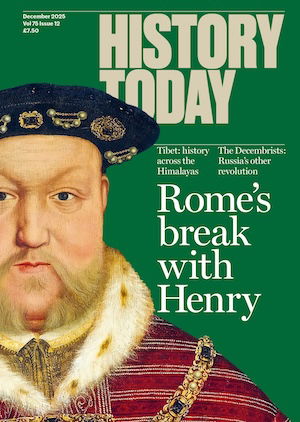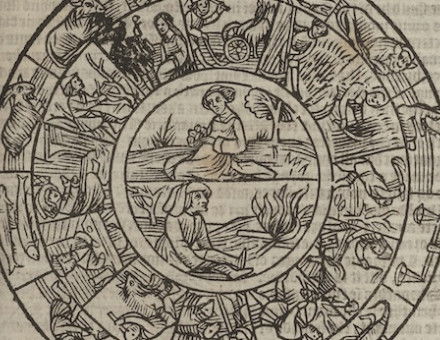A-Level History
Sean Lang describes the changes in college history since the sixties and deplores the trend towards Hitler-dominated history.
A-level history was for many years essentially a solid academic grounding in preparation for university study. Students would cover a period of at least one hundred years, sometimes two, and would produce a series of essays with the help of textbooks which became classics of their kind, like Geoffrey Elton's England Under the Tudors or David Thomson's Europe Since Napoleon. This pattern continued largely unchanged until the 1980s when it became compulsory to include an element of documentary analysis in all history papers, though most boards and schools proved able to take this in their stride. However, the world has not stood still, and A-level history has to some extent had to alter to reflect changes in the school and university systems it serves. The expansion of higher education in the sixties and increasing encouragement to pupils to stay on at school after 16 has increased both the size and the variety of the A-level candidature, new fields of historical research opened up different avenues for these new A-level candidates to study: social history, women's history, cultural history, American or post-1945 history - all of these began to appear on A-level syllabuses, either as examination papers in their own right, or else as options within a broader ‘Outlines’ course.
Some examination boards pioneered even more innovative approaches, including the study of historiography and historical method. One of the most important innovations was the development by the Associated Examining Board (AEB) of the Personal Study, a piece of original research undertaken by students into topics of their own choice. In the early days these tended to concentrate on local history, but as the approach grew in popularity and was taken up by other boards, the scope of students' work grew wider. Historical societies and associations regularly publish numbers of these studies, and the university lecturer who exclaimed that if this level of work was being done at A-level then there was little left for him to do with his third year undergraduates can hardly have been alone in his reaction.
Changes in A-level itself have prompted changes in its services too. Sixth form conference providers are increasingly tailoring their courses to students' requirements, with more emphasis on document work or on active and participatory styles of learning. Longman's Seminar Studies series pioneered a move among publishers towards shorter topic books; Hodder and Stoughton's extensive Access to History series gives detailed guidance on note-taking and even marks points in the text for stopping to take stock. Routledge's Questions and Analysis includes worked answers to document questions. University historians have watched bemused as students come through from A-level unused to handling the weightier texts which their tutors remember from their own days, and Seminar Studies have shifted upwards to become required reading for undergraduates.
Inevitably these developments, aided by an incorrigible tendency in certain sections of the press to sound off hysterically at regular intervals about school history, have led to questions about whether or not A-level history has got easier. This is a much more complex question than it at first appears. In terms of standard essay questions, it is very hard to see any evidence of this. Students are still required to analyse the causes of the First World War or the impact of Thomas Cromwell's administrative reforms, much as they ever were - these tasks have not become ‘easier’ over the years and are marked to the same academic standards as they ever were. In addition, students are required to analyse documentary extracts, sometimes of considerable length, and comment on the historiography of the topics they study, tasks of a very high order of difficulty which were not required of students twenty years ago. No-one who has read through large numbers of Personal Studies, many of which involve students' taking the initiative to seek out materials in archives or university libraries, can be under any illusion that history has been ‘dumbing down’. Indeed, against the widespread perception in the right-wing press that history is getting too easy must be set the widespread impression among teachers and students that, both in terms of its demands on time and in terms of its intellectual content, history is one of the most difficult subjects available at A-level.
On the other hand, some developments have had mixed effects. Where old-style syllabuses used not to specify any content, so that students might learn a number of major topics and then not be asked about any of them in the examination, boards have for some years now specified in some detail exactly what content they expect students to have covered.Unfortunately, exasperated examiners' reports suggest that this has led to some teachers preparing students for the minimum of topics needed to get through the exam. The publication of A-level mark schemes is clearly a positive move - it is hardly fair to expect students to prepare for an examination without giving them a clear idea of what they have to do - but it has meant that teachers have been able to target their teaching more precisely on what will score marks, with predictably beneficial effects on results. Whether this reflects ‘dumbing down’ or ‘grade inflation’ or whether it simply means better teaching is clearly a moot point.
Radical changes to the A-level structure have been proposed at various points since the late 1960s. The main purpose has been to broaden the unusually narrow 3-subject focus of the typical A-level course, and more recently to achieve some form of harmony between the provision of academic and of vocational education. In 1996 Sir Ron Dearing recommended a major overhaul to the whole provision of post-16 education, including a radical restructuring of A-levels. The implementation of his proposals was delayed for a year's further consultation by the new Labour government but they are finally coming into force from September 2000. Under the new system A-levels will be divided into two. The first half, to be called Advanced Subsidiary (AS) will be examined after a year of study. those who so choose may then go on to take the second part (A2) which makes up a full A-level. Since it is the government's intention that students should study four, or even five subjects at AS, AS has both to be the first part of a full A-level and a qualification in its own right, assessed at a lower level than full A level. (The new AS should not be confused with the existing Advanced Supplementary AS, introduced in 1988, which never had an extensive take-up in history).
The full effects of these changes will take time to become clear. It is impossible to predict, for example, what an AS at a standard between GCSE and A-level will be like in practice -- educational history is littered with the corpses of examinations which seemed a good idea at the time. Initial drafts of specimen examination papers suggest that AS will be assessed by a mixture of source questions and structured essay questions of a sort currently in common use with students in the early part of their A-level courses. Sadly, because AS has to be a self-contained qualification, it will no longer be possible to work on a Personal Study over two years, so this invaluable element has had to be cut down to a 2,000-word extended essay. For the first time there is a stipulation that A- level history must contain a substantial element of British history, which, quite apart from raising important issues of academic freedom, is hindering the development of courses in American or International History. The requirement to fit history into a much broader sixth form curriculum has forced the boards to cut down on the content of their proposed courses, with fewer countries covered and a substantial element of ‘revisiting’ periods or events rather than covering the traditional span of a century.
Most disappointingly of all, the new proposals do not address the question of the ever-narrowing field of content that is actually studied at A level. At present, the major periods studied are the Tudor period in both an English and a European context, the nineteenth-century in Britain and Europe, and twentieth century European history up to 1945. Seventeenth century England survives, usually with a heavy emphasis on the first half of the century, and some schools offer special subjects on Louis XIV. There is a significant minority of centres which offer courses in American history or twentieth century Britain, and a small but enthusiastic group of schools which teach medieval history. The eighteenth century, on the other hand has all but died (and the same applies in terms of A-level English).
However, all of these periods are dwarfed by the massive upsurge in the numbers studying the European dictatorships of the 1930s, especially the Third Reich. Although Personal Studies do offer students a chance to spread their historical wings more widely, and many do, even here there is a heavy concentration on twentieth century topics, with strong showings for Women in the World Wars, the Vietnam War, Kennedy and the Cuban Missile Crisis, Martin Luther King, and - unsurprisingly - particular aspects either of life in Nazi Germany or of the Second World War. The peculiar structure of the National Curriculum already means that twentieth century history, and Nazi Germany in particular, features both at Key Stage 3 (14-year-olds) and at GCSE (16-year-olds) so that, inevitably, for many students history and Hitler are fast becoming synonymous. Although university historians rightly deplore this trend, they too are having to bow to pressures and offer more courses in twentieth century history, and the Third Reich in particular. This is a ridiculous and extremely unhealthy situation for the subject to be in, but it will require someone to give strong leadership to reverse the trend, even if this is at the expense of a certain amount of academic freedom of choice. Either the examiners, or the universities will need to make it clear to schools and colleges that an unrestricted diet of twentieth century dictatorships is no way for the subject to move forward into a new century.
- Seán Lang is Head of History at Hills Road Sixth Form College, Cambridge.




